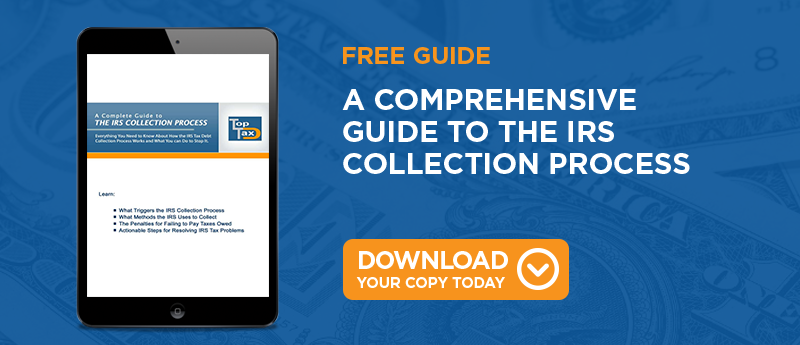What happens if you fail to file your tax return?
The IRS charges a failure-to-file penalty of 5% of unpaid taxes per month, up to 25% of your balance. If your return is over 60 days late, you may owe a minimum penalty of $485 or 100% of your unpaid tax. Filing as soon as possible reduces penalties, even if you can’t pay in full.Every spring, millions of Americans breathe a sigh of relief when they finally submit their tax returns. But for many others, April 15 passes by in silence. Sometimes it’s because they’re overwhelmed, sometimes it’s because they don’t have the money to pay, and sometimes it’s simply because life gets in the way. Whatever the reason, failing to file your taxes on time can have serious consequences. In fact, the penalties for not filing are often more severe than the penalties for not paying.
-1.png?width=780&height=455&name=TTD%20Blog%20images%20(1)-1.png)
At Top Tax Defenders, we’ve seen how quickly a missed deadline can snowball into a much larger problem. Understanding how the IRS calculates penalties—and what to do if you’ve already fallen behind—is the first step toward protecting yourself.
The Penalty for Failing to File
The IRS doesn’t take missed deadlines lightly. If you don’t file your return on time, the government adds a penalty to your balance that grows every month until the return is filed. This charge is known as the failure-to-file penalty.
Here’s how it works: the IRS tacks on 5% of your unpaid tax bill for every month your return is late. The penalty maxes out at 25% of what you owe, but if you let it go that far, the cost can be overwhelming. For example, if you owed $10,000 and didn’t file for three months, you would already owe an extra $1,500 on top of your original tax bill. And remember, interest is added on top of these penalties, making the final amount even higher.
If your return is more than 60 days late, the IRS imposes a minimum penalty. For 2025, that means you’ll owe either $485 or 100% of the unpaid tax—whichever is less. Even if your balance is small, that fee can still sting.
How This Differs From Failure-to-Pay
People often confuse the failure-to-file penalty with the failure-to-pay penalty. The two are related but not the same. Failure-to-pay is less severe—it grows at about 0.5% per month instead of 5%. This difference is intentional. The IRS would much rather see you file your return, even if you can’t pay the full amount right away. Filing shows good faith, while not filing at all suggests avoidance.
In short: if you can’t pay, file anyway. You’ll face a much smaller penalty and can work out a payment arrangement later.
The Risks of Not Filing at All
Failing to file isn’t just about penalties. If you leave the problem unaddressed long enough, the IRS can take matters into its own hands. They may file what’s called a Substitute for Return (SFR) on your behalf. While this might sound like a favor, it’s anything but. The IRS won’t take deductions, credits, or exemptions into account, which means the amount they say you owe will likely be higher than if you had filed on your own.
On top of that, the IRS can move into collections. Tax liens, wage garnishments, and bank levies are all tools they can use to recover unpaid taxes. And in rare but serious cases, repeated willful failure to file can even be treated as a federal crime.
The bottom line: the longer you wait, the more complicated—and expensive—the situation becomes.

What to Do If You’ve Missed the Deadline
If you’ve already missed your filing deadline, the single most important thing you can do is act quickly. File your return as soon as possible, even if you can’t pay right now. Doing so stops the steep 5% monthly penalty from growing any further.
Once your return is filed, you still have options for dealing with the unpaid balance. Many taxpayers qualify for installment agreements, which allow you to pay down your balance over time. In some cases, the IRS may even accept an Offer in Compromise, where you settle your debt for less than what you owe. And if you have a good track record of compliance or a compelling reason for your lateness—like a serious illness or natural disaster—you may qualify for penalty abatement, which removes or reduces the added charges.
How Top Tax Defenders Can Help
At Top Tax Defenders, we’ve helped countless clients take back control after missing tax deadlines. Our team of tax professionals knows how the IRS works, and we’re skilled at negotiating on behalf of taxpayers who feel overwhelmed or cornered.
Over the years, we’ve helped clients reduce penalties, secure payment plans that fit their budgets, and even resolve years’ worth of unfiled returns. We know how stressful tax debt can be, and our goal is always the same: to give you peace of mind and a path forward.
See how we’ve helped people just like you resolve their tax issues and move forward with confidence.
Don’t Wait for the Penalties to Pile Up
Every month you delay filing your tax return makes the problem bigger and harder to solve. But the good news is, it’s never too late to take action. The sooner you file, the sooner you stop the clock on penalties, and the more options you’ll have for resolving your balance.
If you’re facing failure-to-file penalties or you’re worried about unfiled returns, reach out to Top Tax Defenders today for a free consultation. Our team is ready to evaluate your situation, explain your options, and fight for the best possible outcome.
[Editor's Note: This article was originally published in October 2013 but has been updated for accuracy and comprehensiveness.]



